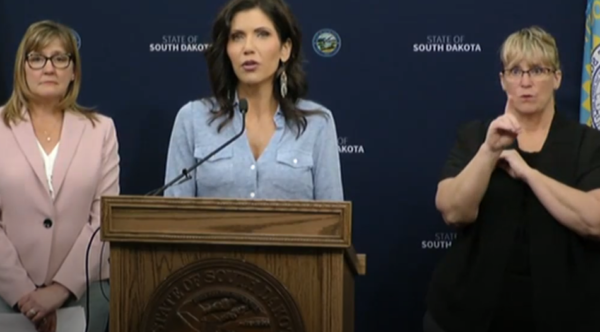
- Details
- By Levi Rickert
PIERRE, S.D. — South Dakota Governor Kristi Noem has turned to the federal government for help in her ongoing showdown with the Cheyenne River Sioux Tribe and the Oglala Sioux Tribes over roadside checkpoints.
At a press conference Wednesday afternoon, Noem said she asked the South Dakota Attorney General to investigate the “unlawful” checkpoints the tribes set up to protect citizens on their reservations from the coronavirus.
"That investigation, while it is still ongoing, has produced both affidavits and video recordings of these unlawful checkpoints that are in place," Noem said, though she did not elaborate on the contents of the material.
Noem said information from the investigation has been sent to the White House, Department of Justice, the Interior Department and South Dakota's congressional delegation.
By asking the federal government to intercede, Noem is escalating the dispute, which began two weeks ago when she threatened legal action against the tribes for setting up checkpoints at the entrances and exits to their reservations.
The two tribes say Noem has not done enough to stop the spread of the coronavirus in the state. South Dakota is one of a small handful of states that never issued a “stay-at-home” during the COVID-19 pandemic.
On Monday, the American Civil Liberties Union (ACLU) of South Dakota announced it would provide support for the tribes in the checkpoint battle with Noem.
The perplexed governor says she asked for their assistance to resolve the situation.
Even though Noem threatened to take legal action, she said Wednesday she had not begun any litigation.
"The state is committed to slowing down the spread of COVID-19 and committed to protecting the public health of our tribes and every single citizen in the state,” Noem said.
Read Noem's Letter to the White House
This is a developing story and will be updated.
More Stories Like This
Native News Weekly (August 25, 2024): D.C. BriefsUS Presidents in Their Own Words Concerning American Indians
NDAA passes House; Lumbee Fairness Act Advances
NFL, Vikings to Host Native All-American Game, Youth Flag Clinic
Senate Committee on Indian Affairs Passes 12 Bills to Strengthen Tribal Communities
Help us defend tribal sovereignty.
At Native News Online, our mission is rooted in telling the stories that strengthen sovereignty and uplift Indigenous voices — not just at year’s end, but every single day.
Because of your generosity last year, we were able to keep our reporters on the ground in tribal communities, at national gatherings and in the halls of Congress — covering the issues that matter most to Indian Country: sovereignty, culture, education, health and economic opportunity.
That support sustained us through a tough year in 2025. Now, as we look to the year ahead, we need your help right now to ensure warrior journalism remains strong — reporting that defends tribal sovereignty, amplifies Native truth, and holds power accountable.
 The stakes couldn't be higher. Your support keeps Native voices heard, Native stories told and Native sovereignty defended.
The stakes couldn't be higher. Your support keeps Native voices heard, Native stories told and Native sovereignty defended.
Stand with Warrior Journalism today.
Levi Rickert (Potawatomi), Editor & Publisher

